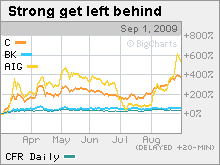Buy good banks. Dump bad banks.
Investors are slowly starting to differentiate between financial stocks that are still troubled and those that are in better shape. It's about time.

 |
| Shares of "weaker" financials like Citi and AIG have bounced sharply from low levels. But financials such as Bank of New York Mellon and Cullen/Frost, which avoided the worst of the crisis, have lagged the bank rally. |
NEW YORK (CNNMoney.com) -- Monday was a good day for the markets.
Yeah, stocks fell. But Monday's action was a healthy sign because some of the rally's biggest financial-sector winners finally started to cool off.
Citigroup, Bank of America, Fannie Mae (FNM, Fortune 500), Freddie Mac (FRE, Fortune 500) and AIG (AIG, Fortune 500) all dipped Monday. Meanwhile, other healthier financials rose.
JPMorgan Chase (JPM, Fortune 500), Bank of New York Mellon (BK, Fortune 500) and U.S. Bancorp (USB, Fortune 500) -- three banks that have already returned bailout funds to the government -- finished the day higher. So did Travelers Group (TRV, Fortune 500), the insurer that replaced Citi (C, Fortune 500) in the Dow back in June.
Among some of the lesser-known financials, Hudson City Bancorp (HCBK), Cullen/Frost Bankers (CFR) and People's United Financial (PBCT) all rose Monday as well. And none of those regional banks ever took a dime in TARP money.
Of course, one day does not constitute a trend. But before the markets took a turn for the worse in late morning trading Tuesday, a similar pattern was unfolding.
The "weak" banks were down earlier while the "strong" were up. The only notable exception was that shares of BofA (BAC, Fortune 500) were up slightly following reports that it was looking to pay back part of the money it received from the government.
In other words, BofA is making an attempt to show that it too belongs in the group of healthy banks. Whether or not BofA will get the green light from regulators to give back some of what it took from taxpayers remains to be seen.
But one fund manager who owns BofA said he thinks the rally in its stock, as well as shares of Citi, does make sense.
Romeo Dator, manager of the U.S. Global Investors All American Equity fund, said the shares of these two banks had been priced earlier in the year as if they would fail. So he thinks the rally is simply a reflection of the fact that this is no longer likely.
As such, he said he thinks it's still a buying opportunity for BofA and Citi, as well as JPMorgan Chase. His fund owns shares of all three. "Now's the time to go with survivors, the long-term winners," he said,
Still maybe, just maybe, investors have tired of bidding up the stocks of some of the banks, insurers and mortgage firms in the short-term for no reason other than momentum. Instead, the higher quality financials are taking their turn leading the way. The wheat is being separated from the chaff.
It's about time. The problem with the latter stages of this explosive market rally, particularly in financials, is that it reeks of day traders chasing momentum on light volume.
It's still a big stretch to claim that the likes of Fannie Mae, Freddie Mac and AIG -- and even Citi and BofA, which as of now still remain on the government dole -- are out of the woods.
That doesn't mean that these stocks deserve to plunge back toward their depressed levels of last fall, winter and spring. But they've rallied too sharply in too short a period of time.
If you want to bet on a recovery in the financial sector and credit markets, wouldn't you prefer to own banks that never got to as much trouble in the first place. In addition to being companies that were better managed, the added bonus is that most of these stocks haven't surged as dramatically.
Sure, this means those banks haven't soared as much as AIG and Citi in the past five months. But it also means these stocks are less likely to take a hit if the broader market pulls back.
"We own banks that didn't have as much exposure to the toxic assets and derivatives. Unfortunately, those banks haven't done as well bouncing from the bottom because they didn't go down as much," said Ted Parrish, co-manager of the Henssler Equity fund, which owns shares of Bank of New York Mellon and Cullen/Frost.
"But going forward, the stronger banks should be under less regulatory scrutiny and will have more opportunities to expand because of their stronger capital bases," Parrish added. "That puts them in an enviable position. There may still be pain to come for some of the weaker financials."
Talkback: Do you think big banks and other financials are in better shape now than they were a year ago or has little changed since last year's credit crisis? Share your comments below. ![]()

